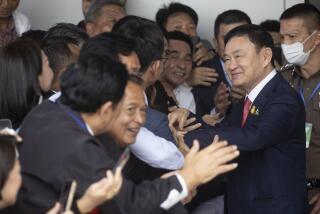Thais Study U.S. Business Ventures
- Share via
Foreign governments and companies often dispatch officials to court U.S. business, but a recent Thai investment mission to Los Angeles had an unusual wrinkle: Its effort wasn’t financed by its own government but by the United States.
The U.S. Agency for International Development is providing $3.5 million to Thailand’s private sector development program. The Asian country has used the money to hire the Cambridge, Mass.-based consulting firm Arthur D. Little Inc. and New York-based Ruder, Finn & Rotman, a public relations company, to help research and analyze U.S. businesses.
The Thai program is one of the first private sector, bilateral projects funded by the USAID.
“More and more, AID is becoming involved in trying to support the private sector,” explained William Nance, officer in charge of the Thai desk at USAID in Washington.
“We strongly believe the stronger the private sector, the more vibrant the economy. . . . The purpose of the (Thai) project is to try to increase private sector employment, export-oriented ventures in Thailand outside of Bangkok,” Nance added.
Reflects Administration View
The shift to private sector development is a departure from the agency’s past emphasis on more public sector areas, such as health and agriculture. It reflects the Reagan Administration’s belief that the agency’s money should be used to help develop employment in foreign countries.
With the help of the USAID office in Thailand, the Asian country has identified three U.S. industries--electronics, metal and machinery fabrication, and agribusiness--that might find Thailand an attractive area in which to develop.
“The U.S. agency wants us to develop Thailand so we can stay free. It is part of the Reagan policy,” explained Chackchai Panichapat, assistant secretary general of the Thailand Board of Investment and leader of the latest Thai mission that visited the United States last month.
“When you support my country in an economic way, you don’t have to send in troops, which costs much more,” Panichapat said.
Richard L. Drobnick, director of USC’s international business, education and research program, said: “Thailand is considered a very important country” to the United States--politically, economically and militarily because of its proximity to Vietnam.
Strong Ally of United States
It has been a strong ally of the United States, aiding U.S. troops in Vietnam and providing camps for large numbers of refugees from Vietnam and Cambodia.
In economic development, it lags far behind its more developed Asian sisters--Japan, Hong Kong, Taiwan and South Korea. It is more commonly compared to other members of the Assn. of Southeast Asian Nations--Malaysia, Singapore, Indonesia and the Philippines.
All are export-oriented and dependent on foreign investment.
Between 1979 and 1983, Thailand’s gross domestic product--its equivalent to the U.S. gross national product--grew at an average annual rate of 5%, discounting inflation. At the same time, Malaysia posted a 12% annual rate of growth, Singapore, 9%, Indonesia, 6%, and the Philippines, 4%.
However, Thailand’s GDP growth rate has slowed to 4.5% this year and is expected to continue at that rate next year, according to Panichapat. He attributed the slowdown mostly to a drop in commodity food prices. Thailand is the world’s fifth-largest food exporter. About 60% of its worldwide exports are food and 40% manufactured goods.
Drobnick says Thailand’s economic growth, while slower than other ASEAN countries, has in fact been more consistent and less volatile than Indonesia’s or Malaysia’s. Both of those countries are heavily dependent on volatile oil exports.
Growth Likely to Slow
He said economic growth in all of the Asian countries is likely to slow. The growth has been due to a huge increase in exports to the United States, which has triggered strong protectionist sentiments in Congress.
“The Thais are worried and concerned, as all the Asian nations are, of the possibility of the U.S. market being closed to them,” Drobnick said. They also want to reduce the dominance of Japanese investment, he added.
U.S. investment in Thailand as of the third quarter of 1983, the latest for which figures are available, totaled $3 billion, with $684.7 million in manufacturing. The United States is the second-largest foreign investor but lags far behind Japan, which has invested more than $6 billion.
No Firm Commitments
Thai government and business representatives wound up an investment mission in November that took them through 10 U.S. cities. They visited 52 American companies--Panichapat declined to identify them--in search of new business opportunities in metal and machinery fabricating.
They didn’t take any firm commitments home to Thailand, but they expect officials of five U.S. companies to visit their country. With the electronics industry in a worldwide slump, however, a previous Thai trade mission aimed at enticing U.S. electronic companies to manufacture in Thailand was less productive.
Thailand will dispatch one more trade mission to the United States next spring. That group will focus on U.S. agribusinesses that might be interested in building processing facilities in Thailand.
The latest Thai delegation had some reservations about approaching U.S. firms at a time when strong protectionist sentiments prevail in Washington.
“We were expecting some hostility but were surprised. Their main concern was about costs,” said William R. Fothergill of Arthur D. Little’s Thailand office, who accompanied the delegation.
Costs are low in Thailand, Fothergill said. The average wage there is 50 cents an hour, or $4 a day, he said.
Furthermore, he added, there are government incentives such as a three- to eight-year “holiday” from the 40% corporate income tax and an exemption from import duties on raw materials and machinery.
More to Read
Inside the business of entertainment
The Wide Shot brings you news, analysis and insights on everything from streaming wars to production — and what it all means for the future.
You may occasionally receive promotional content from the Los Angeles Times.










